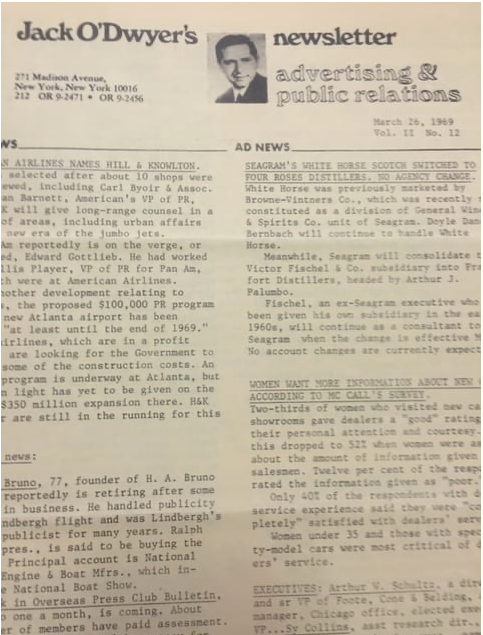Workmanlike, for the Win
April 19, 2024
Writers who want results sometimes have to mute their trumpets. It's neither fun nor easy.
This week, a couple of meditations on writing that works—and how it’s not always the sexiest prose that wins the day. —DM
***
When Workmanlike Is Better Than Exquisite
My first writing job was at a newsletter publisher where substance was much more highly valued than style. In fact, came the edict from the boss, “Ugly sells.”
The theory being that readers of trade newsletters liked their rags “ugly”—here was what one of our leading competitors looked like in 1969, and 1992 …

… because it had an air of down-and-dirty, just-off-the-mimeograph-machine authenticity.
Well, that was hard for the graphic designers, who had gone to school just like us writers. (They took it out on us by never reading our copy, one of them telling me when a column ran short, “Dave, you need to write some more shit.”)
I thought of all that last week when I read some LinkedIn advice by Jake Meth, who helps corporate leaders craft and pitch op-ed pieces for major publications:
Journalists are looking for you to supply the deep insights and knowledge that come from knowing your particular issue exceptionally well. The kind of insights and knowledge they can’t supply themselves.
When I was an editor, and reviewed a pitch that had impressive writing by someone who wasn’t a professional writer, I sometimes became suspicious. I assumed that this person must have worked with a ghostwriter or writing assistant. That detracted from the purity of their message, and made me feel less inclined to run the piece. …
If you’re trying hard to impress an editor with your writing ability, you’re not spending enough energy on making your argument airtight and supporting it as best you can.
Editors are good at gussying up your prose. That’s their job! Let them handle it.
But what if you are a ghostwriter or writing assistant? Are you supposed to write badly, to give your boss more credibility? No. No self-respecting writer could bring herself to do that … and self-respecting is the only kind of writer you should hire.
Here’s how a writer might think about it:
Ghostwrite your op-eds fundamentally. Rock-solid research and unanswerable arguments, expressed in good nouns and good verbs. No single sentence will sing, but the whole piece will stand out as a rare example of constructive, credible, compelling communication.
And you know what? Maybe lose the alliteration.
***
You Communicate Differently When You Communicate for Keeps
Related: Star speechwriter Justine Adelizzi asked recently on LinkedIn: “Tell me why some of the best comms advice I’ve read in a while came from a hostage negotiator.” She offered this, from professional hostage negotiator Scott Walker:
“Remember one golden rule: It’s not about you. The only way to move someone else in your direction and find a solution on which you can agree is to listen deeply and empathetically, ensuring that the other person feels seen, heard, and understood. That is particularly powerful when the two sides are in disagreement. It allows you to build trust, manage expectations, and find ways to meet the other party’s key needs.”
Maybe Justine’s question was rhetorical, but I answered: “Cuz hostage negotiators are doing it for keeps … while so many other communicators are doing it for show.”
And by “other communicators” I mean you, and I mean me. Like nits, our preening, teasing, taunting, insulting, petulant, bullying, passive-aggressive, sarcastic and generally douchey expressions must be painstakingly picked from any prose that truly means to convince another human being of anything. Essentially, you have to take all the fun out of it, which you will fail to do ninety-nine times out of a hundred. But if you’re going to make any progress, you must.
Here’s how it works:
A close correspondent of mine—both a professional psychologist and a fine writer—has a real problem: a hostage situation of her own, you might say. Not trusting her quavering voice or wanting to put the other person on the spot, she felt that a letter was the first-best solution. She wrote the letter. And rewrote it. And over weeks, shaved its skin flaps and murdered its darlings and carved away everything, to the agonizing best of her ability, that didn’t strictly communicate, empathetically, to its recipient. This is what she sent:
Dear Neighbor,
I hope this finds you well.
First let me say that, as someone who’s lived in Jackson Ridge for 20 years, I very much value our community here, and it’s so important to me that everyone feels welcome here. In fact, it’s for that reason that I’ve put off reaching out to you for several years now. However, in the interest of creating a community that is hospitable to all, I’m writing to ask if you would be willing to please keep your dog inside when you are not walking her.
I’m guessing you leave her outside because you think she’ll be happier out there, and I can certainly understand wanting to make your dog happy. However, she barks at every single person who walks by with their dog—which, given that you live directly in front of a trail where people walk their dogs, is pretty much constant.
If you’re leaving her out there in spite of this, I’m also guessing that you’re not aware of just how disruptive your dog’s barking is to the rest of the neighborhood. It seems unlikely that none of your other neighbors have talked to you about this, but perhaps they haven’t. It’s certainly awkward to complain to a neighbor about something they are doing, but it also occurs to me that it’s actually more “neighborly” to express our concerns directly to you than to complain about it behind your back. If I were doing something that was negatively affecting my neighbors’ quality of life, I would certainly want to know about it.
While it may not seem to you a big deal to let your dog bark at passersby, leaving her outside means that everything your neighbors do at home—making coffee, napping, talking on the phone, reading, visiting with friends, attending online meetings, working, making dinner—we have to do while trying (and often failing) to tune out the sound of your dog’s barking. In fact, even as I write this on a Saturday afternoon, I am having a hard time focusing, as your dog is barking at passersby! Many of us moved to this area precisely because it is so quiet and peaceful, but for several years now, with the exception of the very few times when you are out of town or it’s too cold to leave your dog outside, we have not been able to simply enjoy a quiet, peaceful morning or evening or weekend day, and those of us who work from home cannot count on being able to concentrate or attend a meeting without the distraction of a dog barking in the background.
I hope you’ll take this into consideration and keep your dog inside. It would make the neighborhood so much more peaceful and would be so much appreciated!
All best to you,
Did it work? No, it did not. Just as the hostages sometimes die anyway … this neighbor politely thanked my correspondent for her input and issued an elaborate, diffuse and on the whole insane defense. (The mail carrier would be disappointed not to receive his daily savage greeting from the dog. The other neighbors seem to enjoy the barking. Maybe we will take the dog to behavior training one of these days. We have other problems we are dealing with right now. And so on.) But now, importantly, my correspondent knows—beyond a shadow of doubt, thanks to the rhetorical and emotional airtightness of her letter—that she has tried the personal communication route, and her remaining choices now are to: organize the other neighbors to convince or force a change in the behavior … or put up with the barking until the dog, or its owners, leave or die.
And that’s a very important thing to know. And something many of us, even regarding the most intractable disagreements in our lives (and in some of the most important relationships), never do the hard and honest and humbling work to find out.



